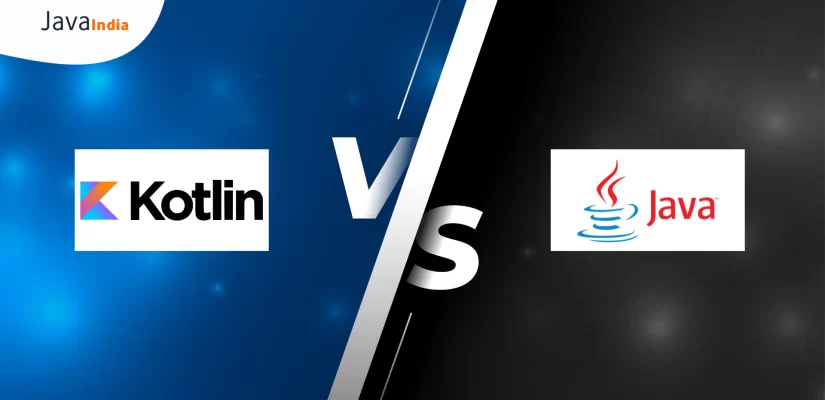
Kotlin vs Java: A Comparative Guide
There are several programming languages used for Android app development, among which Java and Kotlin are two of the best languages, incorporated by most of the Android app development companies.
The differences between Kotlin vs Java have always been a matter of discussion. When it comes to mobile application development services Kotlin is comparatively more welcomed than Java.
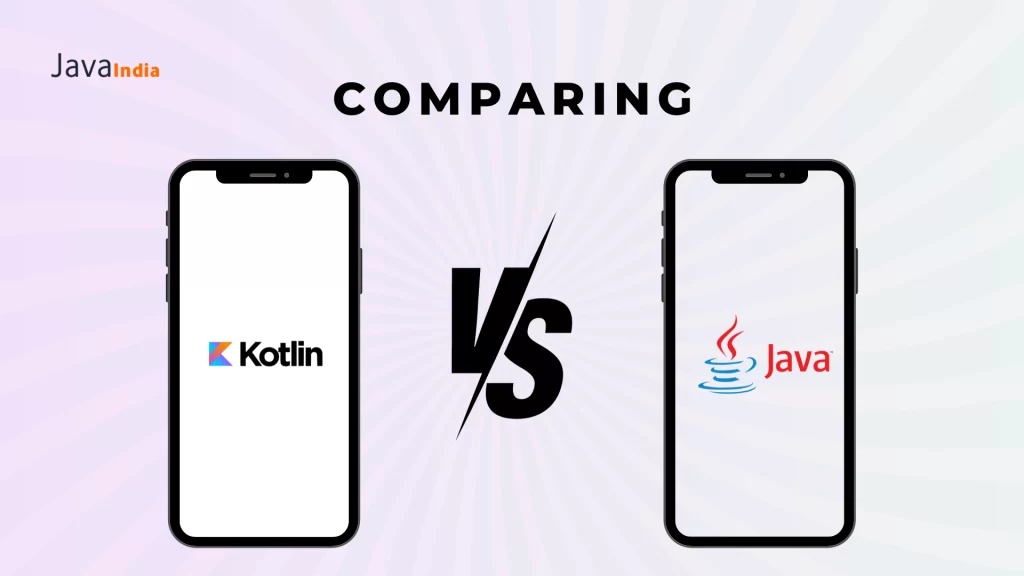
Why are we comparing Kotlin vs Java?
By getting deep into the key differences between Kotlin and Java, understanding the features, advantages, and disadvantages separately will assist you in choosing which programming language to pick for your company.
In the next part of the blog, we will get to know Java and Kotlin individually.
An overview of Java
Java is an extensively used programming language developed by Sun Microsystems. To use this framework, you should consider the basic expertise, benefits, capabilities, and some limitations while implementing it in your web application projects.
Java applications are commonly compiled into an intermediate shape called bytecode. This bytecode can be executed on any device with a Java Virtual Machine (JVM), making Java applications portable.
Java is an object-oriented programming (OOP) language, because of this it revolves around the concept of objects. Objects are times of instructions, and classes outline the facts and conduct of the gadgets.
Java syntax is similar to C++ but removes the features that propose common programming mistakes. It has a simpler and greater consistent syntax.
Java makes use of a garbage collector to automatically manage reminiscence. This approach developers do not need to make it faster up memory as in languages like C++; alternatively, the garbage collection identifies and gets rid of items that are no longer wanted.
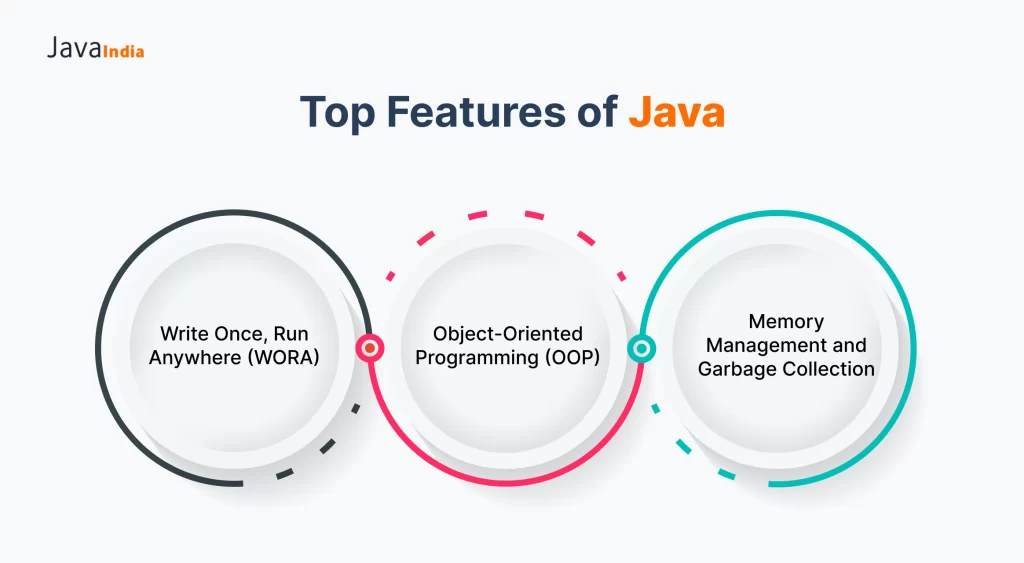
Top Features of Java
- Write Once, Run Anywhere (WORA): One of Java’s maximum giant capabilities is its platform independence. Java programs are compiled into bytecode, which can be carried out on any device that has a Java Virtual Machine (JVM). This “Write Once, Run Anywhere”; precept makes Java quite transportable and allows developers to create applications that could run on various structures without amendment.
- Object-Oriented Programming (OOP): Java is a merely object-oriented programming language, emphasizing the concept of items and classes. This method promotes modularity, reusability, and versatility in software program design. Everything in Java is handled as an item, mainly to more prepared and maintainable code.
- Memory Management and Garbage Collection: Java mechanically handles reminiscence management through its garbage collection mechanism. The garbage collector identifies and eliminates objects that are no longer referenced, stopping memory leaks. This simplifies reminiscence management for developers and reduces the chance of memory-related mistakes.
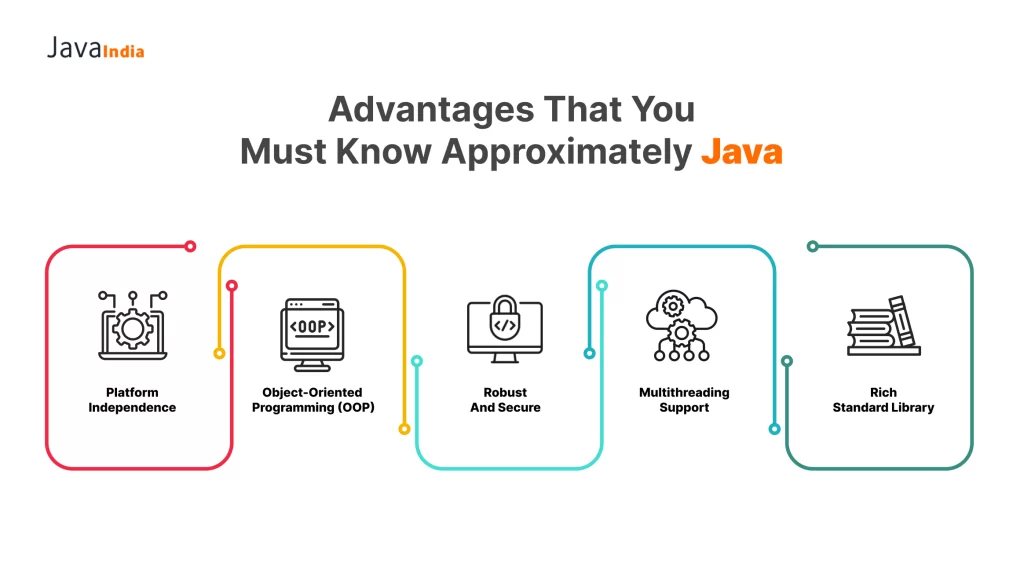
Advantages That You Must Know approximately Java
Platform Independence: Java programs are compiled into bytecode, which can be executed on any tool with a Java Virtual Machine (JVM). This “Write Once, Run Anywhere”; (WORA) functionality makes Java distinctly portable, permitting developers to create applications that could run on numerous structures without change.
Object-Oriented Programming (OOP): Java is a merely object-oriented programming language, promotes using gadgets and lessons. This technique enables code employer, reusability, and maintainability, leading to greater modular and scalable application.
Robust and Secure: Java is designed to be sturdy, with functions inclusive of computerized memory management (garbage series) that allows save you reminiscence leaks and buffer overflow mistakes. Additionally, Java has integrated security features, including using a security supervisor and runtime tests, to ensure the safety of Java applications.
Multithreading Support: Java affords integrated support for multithreading, allowing developers to put in writing applications that could carry out more than one obligation simultaneously. This is mainly beneficial for enhancing the overall performance of applictions that want to address concurrent operations.
Rich Standard Library: Java comes with a comprehensive popular library (Java API) that consists of a wide variety of classes and applications for not unusual programming duties. This makes development quicker and greater green, as developers can leverage pre-built additives for tasks including file, networking, database access, and more.
Some Limitations of Java
While Java gives many advantages, it additionally has a few hazards. It’s essential to observe that the suitability of a programming language depends on the precise requirements of an assignment. Here are some disadvantages of Java:
Performance Overhead: Although Java’s overall performance has progressed over the years, it still includes an additional layer of abstraction through the Java Virtual Machine (JVM). While the use of JIT (Just-In-Time) compilation allows for optimizing overall performance, a few applications can also require decrease-degree optimizations supplied through languages like C++.
Memory Consumption: Java applications could have better memory intake as compared to languages like C or C++. Here, in this case, Java app testing proves its credibility in terms of storage capacity. The automatic memory control (garbage series) method can introduce overhead, and whilst it prevents reminiscence leaks, it is able to lead to occasional pauses in software execution.
Slower Startup Time: Java applications may additionally have slower startup instances compared to natively compiled languages. This may be a difficulty for applications that require brief reaction instances, along with command-line equipment or small software applications.
An Overall Understamding of Kotlin
Kotlin is a contemporary programming language that originated as a task via JetBrains, a software development companies known for its popular integrated development environment (IDE), IntelliJ IDEA.
Kotlin is designed to be fully interoperable with Java, which means that Kotlin code can seamlessly coexist with existing Java code, making it an attractive choice for Android development and different Java-based projects.
Here’s an outline of Kotlin’s key aspects and some characteristics:
Conciseness and Readability
Kotlin is thought for its concise syntax, reducing the quantity of boilerplate code as compared to what Java website development company offers. This enhances readability and makes the codebase more maintainable.
Interoperability with Java
Kotlin is absolutely interoperable with Java, allowing developers to apply existing Java libraries and frameworks in Kotlin tasks and vice versa. This makes the transition from Java to Kotlin gradual and helps the adoption of Kotlin in present tasks.
Null Safety
Kotlin addresses the problem of null references with the aid of making nullability express in the kind system. This allows prevent null pointer exceptions, a common supply of insects in lots of programming languages.
Top Advantages of Kotlin
Smart Casts
Kotlin’s type gadget consists of clever casts, which automatically forged kinds in a secure way after a type check. This eliminates the need for express casting in lots of conditions.
Extension Functions
Kotlin permits developers to add new capabilities to existing training without editing their code. These are known as extension functions and can be used to enhance the readability of code.
Coroutines
Kotlin introduces coroutines, which are a powerful and green manner to carry out asynchronous programming. Coroutines simplify the handling of asynchronous obligations without the complexity of conventional callback-primarily based methods.
Data Classes
Data lessons in Kotlin automatically generate boilerplate code for rare obligations together with equals, hashCode, and toString. This is especially beneficial for lessons that basically preserve information.
Disadvantages of Kotlin
While Kotlin offers many advantages, it is crucial to not forget capacity risks as nicely.
Here are some elements that a few developers may additionally view as negative aspects:
Learning Curve for Java Developers
Although Kotlin is designed to be interoperable with Java, there can nonetheless be a learning curve, especially for developers transitioning from Java. While Kotlin’s syntax is concise, it introduces new principles and capabilities that could take time to master.
Smaller Community Compared to Java
While Kotlin’s network is growing hastily, it is nevertheless smaller than Java’s. This way that there are kind of less sources, libraries, and community support available compared to more established languages Java Maintenance and Support.
Compilation Speed
In a few instances, Kotlin compilation may be slower than Java compilation. While this could now not be a vast issue for small to medium-sized tasks, it could be a attention for large initiatives with huge codebases.
Runtime Overhead
Kotlin, like Java, runs on the Java Virtual Machine (JVM). While the JVM presents advantages which includes platform independence, it also introduces some runtime overhead. This overhead may be a challenge for overall performance-important applications.
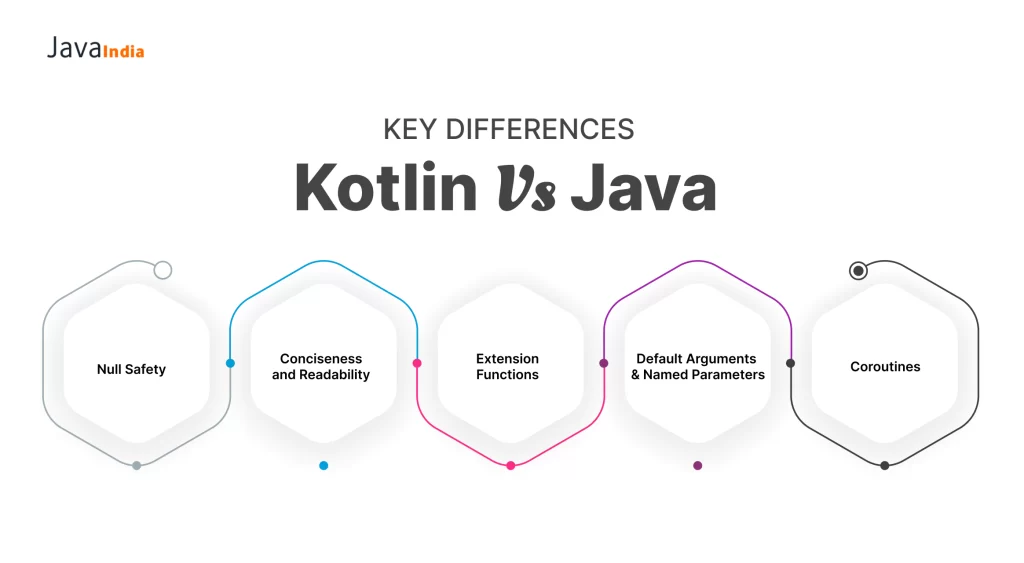
Key Differences: Kotlin vs Java
Kotlin and Java are both programming languages that run at the Java Virtual Machine (JVM), and they may be interoperable, meaning you may use them collectively inside the equal project. However, there are numerous key differences among Kotlin and Java.
Here are some of the principle distinctions:
Null Safety
Kotlin: Null protection is a fundamental function in Kotlin. In Kotlin, variables are non-nullable through default, and if you need a variable to be nullable, you have to explicitly claim it as such. This helps save you null pointer exceptions.
Java: Java allows variables to be null by means of default, and developers want to manually take a look at for null to avoid null pointer exceptions.
Conciseness and Readability
Kotlin: Kotlin has a more precise syntax in comparison to Java. It reduces boilerplate code, making the codebase more readable and expressive.
Java: Java code has a tendency to be random and developers frequently want to jot down more code to acquire the same capability.
Extension Functions
Kotlin: Kotlin introduces extension features, allowing developers to feature new features to current training with out enhancing their code. This feature enhances code enterprise and clarity.
Java: Enterprise Java development company on the contrary has the option to improve their support for extension capabilities, so developers generally want to create application classes or static strategies for comparable functionality.
Default Arguments and Named Parameters
Kotlin: Kotlin helps default arguments and named parameters in feature calls, making it extra flexible whilst calling capabilities with a subset of parameters.
Java: Java no longer supports default arguments or named parameters. Overloaded methods are typically used to obtain comparable behavior.
Coroutines
Kotlin: Kotlin introduces coroutines, which simplify asynchronous programming. Coroutines provide more readable and concise manner to put in writing asynchronous code compared to standard tactics.
Java: While Java has libraries for managing asynchronous operations (e.G., CompletableFuture), it would not have local language aid for coroutines.
Kotlin vs Java: Which One to Choose?
The desire among Java and Kotlin relies upon on various factors, inclusive of the mission necessities, the development group’s information, and personal possibilities. Both languages have their strengths, and the better objective frequently depends at the particular context.
Here are some considerations that will help you decide which language is probably extra appropriate in your wishes:
Java
Mature Ecosystem
Java has been around for a long term, and its atmosphere is sizable. There are numerous libraries, frameworks, and equipment available for Java web development.
Large Community
Java has a large and lively community of developers. This means there are abundant sources, forums, and documentation available for troubleshooting and studying.
Platform Independence
Java’s “Write Once, Run Anywhere”; philosophy makes it appropriate for go-platform development. Java programs can run on any device with a Java Virtual Machine (JVM).
Established in Enterprise
Java is widely utilized in corporation-degree programs, and many big-scale systems and essential commercial enterprise programs are constructed with Java.
Kotlin
Conciseness and Readability
Kotlin has an extra concise syntax in comparison to Java, which can cause extra readable and expressive code. This can decorate developer productivity and decrease the likelihood of mistakes.
Null Safety
Kotlin’s null safety features help save you null pointer exceptions, a common supply of bugs in Java. This can result in more stronger and reliable code.
Modern Language Features
Kotlin carries cutting-edge language capabilities, which include extension capabilities, coroutines, and facts instructions, that could simplify development and enhance code.
Interoperability with Java
Kotlin is absolutely interoperable with Java, allowing developers to use each language inside the identical challenge. This makes it less difficult to integrate existing Java code into Kotlin progressively.
Official Language for Android
Kotlin is the professional language for Android development, as recommended by way of Google. It has gained great recognition inside the Android development network.
Built-in Coroutines
Kotlin’s coroutines provide a greater readable and concise way to handle asynchronous programming in comparison to Java’s traditional processes.
Considerations
Project Requirements: Consider the specific requirements of your mission. If you are running an Android application, Kotlin is a natural choice. For current Java initiatives, you might weigh the blessings of adopting Kotlin incrementally.
Team Expertise: The knowledge and familiarity of your development team with a particular language can play an important role. If your crew has considerable experience with Java and is not acquainted with Kotlin, the learning curve is probably a thing.
Industry Standards: In some industries or organizations, there are probably established requirements or tips that impact the selection of programming language.
Personal Preferences: Developer choices and luxury with a specific language additionally rely. Some developers might opt for the concise syntax of Kotlin, but at the same time as others can be more snug with Java’s traditional syntax.
Concluding Thoughts
Both Java and Kotlin have their advantages and disadvantages. The incorporation of any of them into your company depends on the type of projects you are dealing with. For new tasks, in particular, in Android development, Kotlin is considered to be a strong competitor to Java.
FAQs
Which is better Kotlin vs Java?
Java is a more complex programming language, yet it is easier to learn. Kotlin is clearer, but also more flexible and widely applicable, which makes mastering it more difficult.
Why is Kotlin safer than Java?
Java attributes null values to any variable, which may lead to errors at runtime and time-consuming debugging. Kotlin has built-in null safety and prevents null values from being assigned, which makes code more reliable and less prone to errors by default.
Is Kotlin functional or OOP?
Kotlin has both object-oriented and functional constructs. You can use it in both OO and FP styles, or mix elements of the two. With first-class support for features such as higher-order functions, function types and lambdas, Kotlin is a great choice if you’re doing or exploring functional programming.

